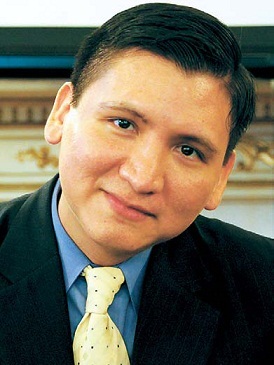Korea is ripe for high-frequency trading, according to one expert who led a workshop on the subject in Seoul last week.
The Speed Traders Workshop took place on Wednesday in Gangnam, covering strategies for high-frequency trading, regulation, the future of the practice and other concepts. High-frequency trading refers to the use of sophisticated technology allowing for the execution of millions of securities trades per second.
The workshop was led by Edgar Perez, author of “The Speed Traders: An Insider’s Look at the New High-Frequency Trading Phenomenon That is Transforming the Investing World.” Perez, a former IBM and McKinsey & Company consultant and founder of Golden Networking, has led workshops and given presentations on the subject of high-frequency trading around the world. He is scheduled to give 15 such workshops in 2012, with cities including Kiev, Shanghai, Hong Kong and Mexico City to follow Seoul.
Perez has said that he sees individuals involved in hedge funds and private equity who are now looking to take part in high-frequency trading.
“Major hedge funds have built algorithmic and high-frequency trading internal groups that leverage the techniques employed by the pioneering proprietary shops; therefore, the learning curve has not been as steep as it could be thought, given the fact that the strategies are completely similar, albeit using different timeframes,” he said via e-mail.

Edgar Perez
“For private equity firms, the race has been about investing in the most promissory firms, providing them with the capital these firms need to constantly upgrade their competitive advantages, both strategies and technology.”
It was not his first visit to Seoul, having offered a presentation at the FIXGlobal Face2Face Forum Korea in November at the Westin Chosun in Seoul.
“While high-frequency trading has been predominant in equity markets in the U.S. and Europe, South Korea provides a market with virtually unlimited opportunities, consequently, potentially driving adoption faster,” he said.
“High-frequency trading business models account for transaction costs and still make a profit; of course, profits in U.S. and European markets are becoming harder to come by, therefore, markets like the South Korean one hold promise of higher profits that will be of interest for Korean and non-Korean traders.”
Though growing in popularity, not all of the attention high-frequency trading has received has been flattering: It is blamed by some regulators for contributing to the “Flash Crash” of May 6, 2010, in which the Dow Jones Industrial Average rapidly lost 1,000 points ― around 9 percent ― but then recouped most of those losses in minutes.
Nearly five months later, a joint report by the U.S. Securities and Exchange Commission and the Commodity Futures Trading Commission said that, while the sell-off had started with a single large sale by a U.S.-based mutual fund company, high-frequency traders had accelerated the losses that followed.
Perez said that senior officials of the SEC are among those he has addressed on the subject of high-frequency trading, which he said shows their interest in becoming knowledgeable on the subject.
“Some people claim that (high-frequency trading) is against regulation,” Perez said. “Actually, (high-frequency trading) is the result of the marriage of regulation and technology evolution: you need fast computers to capture small pricing discrepancies, and once you have that, you need regulations to authorize new trading venues, integrate quotations and provide the overall legal framework.
“With measured regulatory steps, high-frequency trading will continue evolving and contributing to the overall financial markets.”
Perez recommends that those interested in learning more about the subject or keeping tabs on new developments in the field of high-frequency trading follow the blog UltraHighFrequencyTrading.com or look for the Speed Traders Workshop 2012 DVD video package.
He said that discussions with local publishers over a Korean-language edition of “The Speed Traders” are under way.
By Rob York (
rjamesyork@heraldcorp.com)






![[KH Explains] How should Korea adjust its trade defenses against Chinese EVs?](http://res.heraldm.com/phpwas/restmb_idxmake.php?idx=645&simg=/content/image/2024/04/15/20240415050562_0.jpg&u=20240415144419)